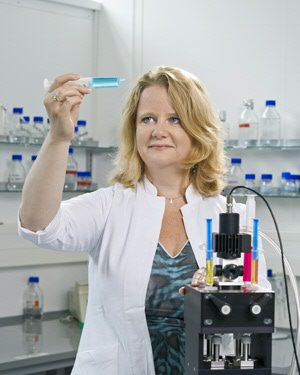Moniek Tromp appointed as new Professor of Materials Chemistry at the Zernike Institute of Advanced Materials
Chemist Moniek Tromp has been appointed Professor of Materials Chemistry at the University of Groningen. “My research into the characterization of materials lies on the interface of physics and chemistry and fits well within the Zernike Institute of Advanced Materials, where I will work.” Tromp will commence her activities in Groningen on July 1.

Moniek Tromp (Apeldoorn, September 7, 1977) used to work as Professor at the Technical University of Munich in Germany. Four years ago, she and her family moved to Amsterdam, where she became Associate Professor at the Van ‘t Hoff Institute for Molecular Sciences at the University of Amsterdam. “I worked on the interface of physics and chemistry, developing techniques for the characterization of materials and catalysis. In Groningen, there are many more researchers who are active in related fields, and with whom I can collaborate. That is why I appreciate the opportunity to work in Groningen.” Tromp won the Athena Prize 2017 of the NWO. This prize awards excellent female chemists who are a role model for researchers. She received the prize for her original and creative work in her field of research, and for her persistent and courageous efforts for gender equality.
Tromp’s research aims at the understanding and characterization of materials. “We developed our own spectrometer for this purpose, specially geared towards experiments with x-rays. This allows us to do the research in Groningen instead of going abroad. We also develop devices to take measurements in varying conditions, for instance at high pressure and temperature.” Tromp’s work addresses relevant issues. “For example, I have current projects with BMW, VARTA, and Volkswagen, but also with smaller Dutch companies such as E-Stone. In our collaboration we search for new materials to develop better batteries for electric cars, so that those cars can drive farther and charge faster without exploding.” Tromp also works with the Rijksmuseum in Amsterdam. “Together, we look for ways to clean pieces of art without damaging them, and we try to understand why paintings fade and paint corrodes.”
For the coming years, Tromp has plenty of scientific ambition. “I want to be able to perform more specialized research techniques in our own laboratory. We also continue to pursue the question what precisely is the active site of specific catalysts. We see that they do something, but we don’t always know how they do it.” But the ultimate challenge lies in the field of energy. “I think that we have reached a theoretical limit for the energy storage in lithium batteries. At some point, there simply is no more room for improvement. In the years to come, we must look for other ways to store energy - a new kind of battery, or an entirely different approach to the usage and storage of energy. What that will look like, I don’t know yet; there are many possibilities which are currently being investigated, and we hope to find out more in the near future.”
More news
-
15 September 2025
Successful visit to the UG by Rector of Institut Teknologi Bandung
